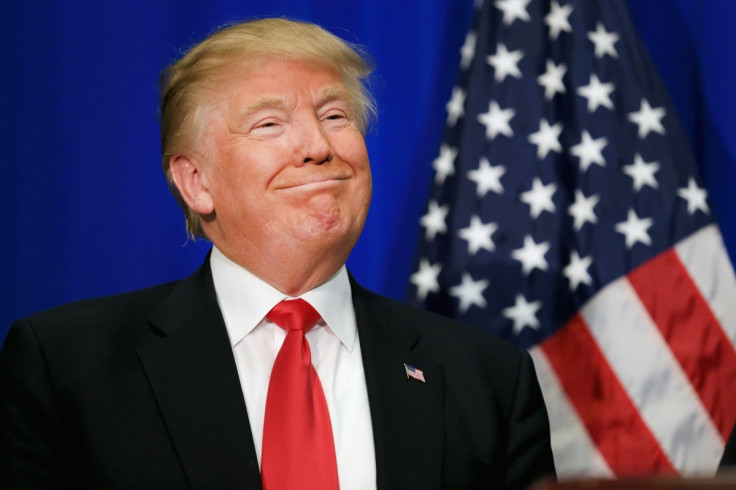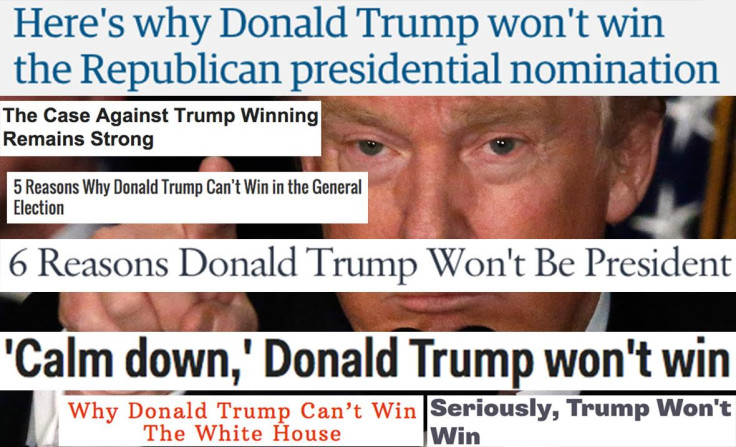Just-world bias has twisted media coverage of the Donald Trump campaign

Donald Trump dominated the Super Tuesday primaries, and is now well on the way to winning the Republican Party nomination for the presidency. Why did almost no one see this coming? Nearly all media coverage before January assumed that Trump winning the nomination was an exceptionally improbable event. So what did everyone miss?
Firstly, the argument could be made that the pundit class was right all along: Trump's success was a very low probability event at the time, and that if we could go back and re-run history from whenever Pundit X wrote their thinkpiece, Trump would lose in 95 out of 100 alternate timelines.
This is a slightly better argument than it sounds. It can't be proved wrong, though it can't be proved right either. As a point against it, it's worth noting that a lot of people who might try to defend themselves based on this argument rooted their own case against Trump on some logically shaky grounds.
For instance, it was almost a sine qua non of Trump thinkpieces to find some comparison of Trump to previous ephemeral presidential candidates like Herman Cain and Michele Bachmann, when this argument was always dubious: Trump's lead in the polls was, by winter 2015, far more prolonged than theirs, and his support reached more broadly across the Republican party.
Secondly, one might argue that pundits used models based on past presidential campaigns that were unable to account for Trump's pre-campaign media profile, his charisma, his wealth, and the unique economic and social circumstances of much of Middle America today. Nate Silver is a pretty fantastic forecaster, and FiveThirtyEight's coverage of the primaries has been outstanding, but if there's one solid criticism to be made of Nate the Great, I think it's perhaps this one.
Thirdly, perhaps some pundits were not actually making predictions, but were trying to shape the future. When Rick Wilson says in July 2015 that "the Donald Trump candidacy is almost over", is he making an honest forecast? Or is he advocating for what he hopes will come true, aiming to construct an unfavourable media environment for Trump and prevent voters from taking the campaign seriously? For sake of pundit accountability, we might wish that the Rick Wilsons of this world would clarify when they are simply cheerleading for their political team, but we cannot compel them to do so.

My own argument incorporates elements of the above and adds another variable: punditry has been afflicted by just-world bias. The belief that the world is a just and righteous place is one of many fallacies that is deeply rooted in human psychology, and when faced with evidence that contradicts this hypothesis, many will go to extreme lengths to adjust evidence in order to fit with their worldview.
Many have found Trump's rhetoric disgusting and upsetting, and find it painful to acknowledge that policies such as a temporary ban on Muslim immigration to the US are vote-winners. Few want to admit that in a democracy is that there are only limited returns to appearing wise and virtuous. Belief in the goodness of the mob is a refined version of the just-world hypothesis, one that is especially prevalent amongst modern-day elites. Antoine de Rivarol's dictum lies ignored: "The monarch may be a Nero, but he is sometimes a Titus or Marcus Aurelius; the people is often a Nero and never a Marcus Aurelius".
Just-world bias is so powerful that not even presidents are immune. Barack Obama is notorious for stating that various malefactors are on the "wrong side of history". Of course there is no such thing as the wrong side or right side of history – but the need to believe in such things is fundamental to human cognition.
Although it's hard to prove beyond all doubt that just-world bias has coloured media coverage of the Trump campaign, David Remnick, editor of the New Yorker, agrees, noting: "The fact that so many of us, all of us, were wrong in predicting anywhere near the extent of his success so far, may be partly due to the fact we didn't want to believe those currents [of nationalism] could be appealed to so well and so deeply and successfully". Remnick, who moves in elite media circles, is well-placed to make such a judgement.
So how are we to find trustworthy forecasters who are unlikely to fall prey to these traps of cheerleading on the one hand, status quo bias on the other, and just-world bias on the third? The Intelligence Advanced Research Projects Activity organisation (IARPA) a branch of the US intelligence community that funds futuristic projects for the eventual benefit of US intelligence agencies, such as the CIA, wanted this question answered.
IARPA collaborated with Philip Tetlock's Good Judgment Project team at the University of Pennsylvania to run forecasting tournaments and identify superforecasters, individuals who were consistently highly accurate in their forecasts as measured by an objective scoring system. Perhaps we should learn to pay more attention to superforecasters than well-connected pundits. Perhaps we should even demand that such pundits routinely submit themselves to the discipline of the Brier score.
My Brier score can be found at a new forecasting tournament that Good Judgment Inc. are hosting, and it's one that's open at the public, so you can sign up and begin testing yourself. During my forecasting efforts, I came across Jean-Pierre Beugoms, who is one of those fabled superforecasters from the IARPA-hosted tournaments. On 18th November 2015, Jean-Pierre forecast that there was a 68% probability that Trump would be the nominee. His reasoning is available to view here, and it it a masterpiece of prescient, bloodless analysis, devoid of emotional flummery.
Tetlock's research has shown that superforecasters are better at prediction partly because they are not afraid of social taboos that operate to restrict rational thought around topics that society deems off limits. If you want to get better at forecasting, learn to break those taboos. And if those same pundits who didn't predict Trump's success in the primary tell you that he can't possibly beat Hillary Clinton in the general election, consider that they may well be wrong again, for exactly the same reasons as they were wrong before.
© Copyright IBTimes 2025. All rights reserved.






















